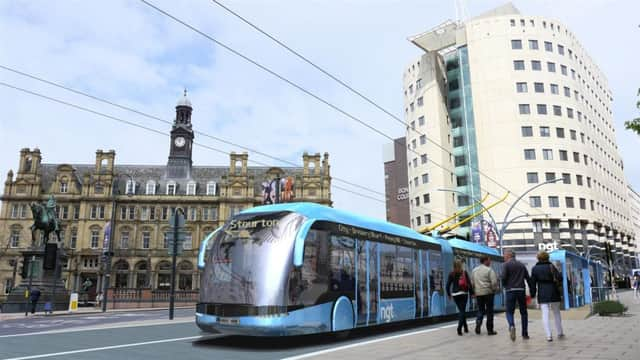Revealed - the £630-a-day cost of Leeds trolleybus scheme inspector


As previously reported by The Yorkshire Post, the overall bill for the taxpayer-funded inquiry process could be as much as £2.6m.
Now a request under the Freedom of Information Act has revealed how much of the final total will cover the £630-per-day work of Martin Whitehead, the Government-appointed inspector who headed up the inquiry.
Advertisement
Hide AdAdvertisement
Hide AdThe Department for Transport (DfT) is being invoiced £157,162 for his time, with individual expense items including:
n £10,596 for Mr Whitehead’s preparatory work;
n £41,170 for the days that the inquiry sat in Leeds between April and October last year;
n £83,941 for Mr Whitehead’s work on the post-inquiry report to the DFT that will decide the fate of the trolleybus scheme.
Other expenditure includes £5,709 on hotel stays and £2,154 on “subsistence”.
Advertisement
Hide AdAdvertisement
Hide AdThe Yorkshire Post can also reveal that Mr Whitehead’s all-important report has now been submitted to the DfT, although a decision on the trolleybus scheme’s future is not expected until late this year or early next.
The cost of the inquiry process was yesterday condemned by Leeds-based transport campaigner Stuart Long.
Mr Long said: “Many taxpayers have been strongly against this project from the start but they are the ones picking up the bill for the inquiry.
“There are countless ways that this money could have been put to better use, not least helping the city’s poor and homeless.”
Advertisement
Hide AdAdvertisement
Hide AdGovernment ministers handed Leeds’s New Generation Transport (NGT) trolleybus scheme £170m of funding in the summer of 2012. However, the scheme’s promoters – Leeds City Council and the West Yorkshire Combined Authority (WYCA) – still need to secure a Transport Works Act Order (TWAO) for legal permission to commission, build and operate the system.
Whitehall’s decision on the award of the TWAO will be based on Mr Whitehead’s post-inquiry report and recommendations. Construction work on the system – which would run from Holt Park in the north of the city to Stourton in the south – could start by 2017 if it clears that final hurdle.
Critics of NGT say it represents poor value for money and would damage the environment.
A spokesman for the WYCA said: “Any project of the size and scale of NGT has to undergo a public inquiry of the kind that took place between April and October last year and the one that took place for [Leeds’s axed] Supertram scheme in 1997.
Advertisement
Hide AdAdvertisement
Hide Ad“The costs of an inquiry are affected by its duration and that is to a very large extent dependent upon the number of submissions made by objectors.
“During last year’s 72-day inquiry, NGT was subject to significant public scrutiny through representations from individuals and the First bus company’s legal experts.”
The spokesman added that the WYCA remained confident that the case for the scheme was “compelling”.
Leeds’s trolleybus plans were drawn up after the then Labour government controversially scrapped the more ambitious Supertram light rail project in 2005 amid worries about spiralling costs.